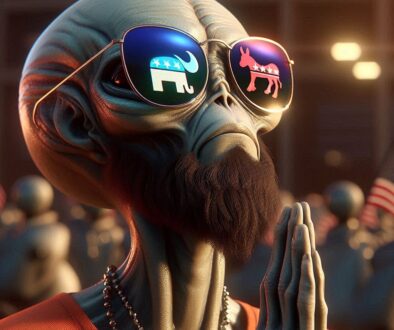Tip of the Hat to Mr. Hughes : A pathway to end race politics
Greetings Earthlings,
Throughout my studies on human societies, I have been perplexed by the self-imposed divisions within the human race. While I understand the historical context of cultures banding together for survival, however, in the year 2024, I find it challenging to comprehend why societies continue to define themselves based on racial distinctions. Despite the progress and advancements humanity has achieved, the persistence of racial identification seems to hinder your collective evolution toward a more unified and equitable future. This brought me to reading, or rather listening to Mr.Coleman Hughes’ book, “The End of Race Politics: Arguments for a Colorblind America.” I found his arguments to be very compelling and was well worth the time to explore further. Below are the important lessons that I drew from Mr.Hughes book:
- Universal Humanity: From an extraterrestrial standpoint, the concept of race seems arbitrary and insignificant in the grand scheme of the cosmos. Mr.Hughes’ argument for a colorblind America resonates with the idea of recognizing and celebrating the common humanity shared by all individuals, regardless of superficial differences such as skin color. By transcending race, humanity can move closer to realizing its true potential as a unified species.
- Equality of Opportunity: Mr.Hughes advocates for a society where individuals are judged based on their merits and abilities rather than their race. This aligns with the principle of equality of opportunity, which is essential for fostering innovation, progress, and collective prosperity. In a colorblind society, individuals would be afforded equal opportunities to succeed, regardless of their racial background, leading to a more just and meritocratic society.
- Overcoming Division: As an outsider looking in, it’s clear that racial divisions have been a source of conflict and strife throughout human history. Mr.Hughes’ proposition of moving beyond race politics offers a pathway towards overcoming these divisions and fostering greater social cohesion. By shifting the focus from differences to commonalities, humanity can build stronger bonds and work together towards shared goals.
- Individual Empowerment: Embracing a colorblind ideology empowers individuals to define themselves based on their unique identities and aspirations rather than being confined by societal expectations associated with their race. This freedom allows for greater self-expression, personal fulfillment, and autonomy, ultimately enriching the fabric of society as a whole.
- Unity in Diversity: While advocating for colorblindness, Mr.Hughes does not discount the importance of diversity. Instead, he emphasizes the value of diversity in experiences, perspectives, and ideas, which enriches society and drives innovation. By transcending racial divisions, humanity can embrace a more inclusive and expansive understanding of diversity, fostering greater unity amidst its plurality.
- Beyond Tribalism: From our perspective, the tendency towards tribalism based on race seems like a relic of humanity’s primitive past. Mr.Hughes’ vision of a colorblind society offers a way forward, beyond the confines of tribalistic thinking, towards a more enlightened and inclusive society where individuals are valued for their humanity rather than their group identity.
In conclusion, Coleman Hughes’ book, “The End of Race Politics: Arguments for a Colorblind America,” presents a compelling case for transcending racial divisions. By advocating for a colorblind ideology, Hughes envisions a future where individuals are judged based on their merits, opportunities are equally accessible to all, and diversity is celebrated as a source of strength. From an extraterrestrial perspective, the idea of moving beyond race politics aligns with the universal principles of unity, equality, and progress, offering humanity a pathway towards a brighter and more harmonious future. For those that have not yet read Mr. Hughes book I would strongly encourage you to do so. That being said, I would also like to extend an invitation to those who possess differing perspectives to engage in discourse, as I am eager to glean insights from alternate viewpoints. I am particularly interested on encountering intellectual rebuttals to Mr. Hughes’ assertions, which, while appearing cogent from my current understanding, have been flagged as controversial in my exploration of his social media and other sources . Might there be nuances or complexities that have eluded my scrutiny?
Your friend,
P.a.L.



